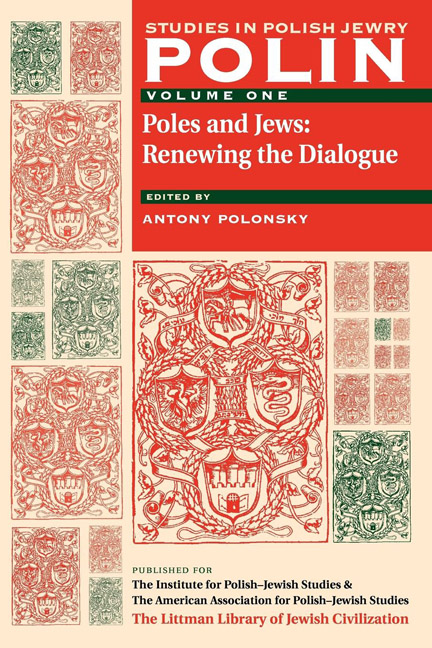Book contents
- Frontmatter
- Dedication
- Editors and Advisers
- Contents
- Polin
- Statement From the Editors
- ARTICLES
- DOCUMENTS
- INTERVIEW
- A DIALOGUE
- BIBLIOGRAPHICAL ESSAYS
- The Jewish Community of the Second Republic in Polish Historiography of the 1980s
- The Western Allies and the Holocaust
- Five Wartime Testimonies
- Ashkenazicjewry and Catastrophe
- BOOK REVIEWS
- CONTRIBUTORS
Five Wartime Testimonies
from BIBLIOGRAPHICAL ESSAYS
- Frontmatter
- Dedication
- Editors and Advisers
- Contents
- Polin
- Statement From the Editors
- ARTICLES
- DOCUMENTS
- INTERVIEW
- A DIALOGUE
- BIBLIOGRAPHICAL ESSAYS
- The Jewish Community of the Second Republic in Polish Historiography of the 1980s
- The Western Allies and the Holocaust
- Five Wartime Testimonies
- Ashkenazicjewry and Catastrophe
- BOOK REVIEWS
- CONTRIBUTORS
Summary
Five diary accounts, published in Polish in 1983-4, relate the wartime fate of people brought up in Poland's largest Jewish urban centres before 1939: Warsaw, Łódź and Cracow. A feature common to all of them is their authors’ social and professional membership of the intellectual class and the relatively significant attachment they felt towards their Polish environment. Four of the authors belong to the generation born before the establishment of an independent Polish state in 1919 and one account is that of a girl barely 15 years of age when World War II broke out; thus her adult life began in conditions of oppression and subjection.
Leon Tyszka's diary notes, Sukcesy i klęski jednego życia ('The success(!s and disasters of one lifetime’) are of particular interest for a variety of reasons. Only one-third of the book deals with the war and, as a whole, it contains more about the author's well-deserved successes - gained, after all, through his own work and abilities - and less about the disasters, which must undoubtedly include the mortal danger to life under Nazi occupation. The author, born in Piotrków, the son of a minor official, was typical of the circles of young Jewish intellectuals which existed in Poland before 1939 (two of his brothers were doctors and two sisters were teachers). During his economic studies from 1924-28 at the Higher Commercial School in Warsaw, Tyszka was president at his institute of the student organisation ,Zjednoczenie (Unification) which mainly attracted that section of Jewish youth which inclined towards assimilation. Immediately on completing his studies and until the outbreak of World War II, he held an important position as a specialist on passenger sea-travel and problems of tourism, first in Germany before Hitler (Norddeutscher Lloyd in Bremen, 1929-33), then in Warsaw. He played a major part in the development of Orbis (the Polish tourist organisation) offices abroad, in Palestine, the United States and Great Britain. Tyszka writes with warmth about Dr. Zdzisław Kurnikowski, then the Polish Consul-general in Jerusalem with whom he worked, and gives a precise description of his contribution in organizing Polish travel bureaux in Tel Aviv and London.
- Type
- Chapter
- Information
- Poles and Jews: Renewing the Dialogue , pp. 316 - 326Publisher: Liverpool University PressPrint publication year: 2004



